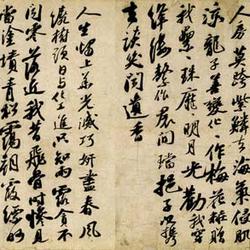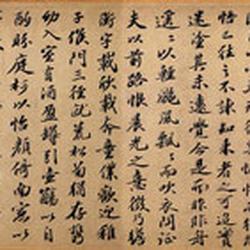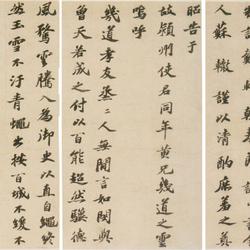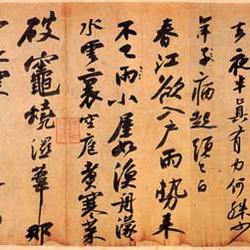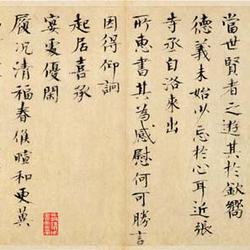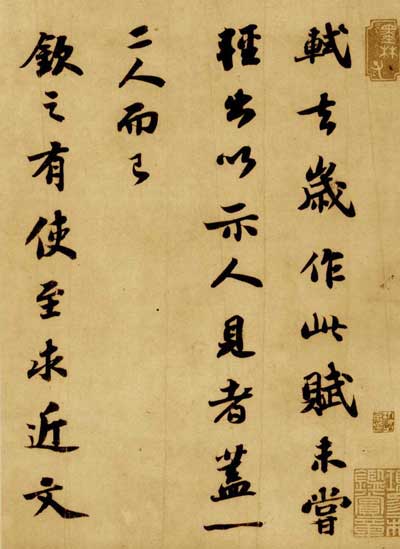
On July 16, the fifth year of Shenzong Yuanfeng (1082), Su Shi and his friends took a boat trip to Chibiji outside Huangzhou City. They recalled the Battle of Chibi where Sun Quan defeated Cao's army more than 800 years ago during the Three Kingdoms era, and wrote "Chibi Fu" to express his feelings. Views on the universe and life. In October of the same year, he revisited and wrote another "Ode to the Red Cliff". The two articles are widely circulated and are famous masterpieces in the history of literature. This volume is written in regular script, with short, flat and tight knots, and rich and thick pen and ink. It is a rare and intentional work in middle age.
This volume is the "Ode to the Former Red Cliff" written by my friend Fu Yaoyu (1024--1091). He knew that he "composed this poem last year", so he knew it was written in the sixth year of Yuanfeng, when he was forty-eight years old. There is a missing line at the front of the scroll. It was once collected by Jia Sidao, Wen Zhengming, Xiang Yuanbian, Liang Qingbiao, etc., and later entered the Qing Dynasty. The strokes of this stroke are strong and powerful, trying to penetrate the back of the paper; in the broad and plump fonts, the force is condensed in the bones and muscles, which is called "pure cotton wrapped in iron". This kind of power often shines out from the sharp edges, kicks, and turns, just like the bright eyes that sometimes look around in the broad appearance. What is particularly intriguing is that Su Shi's choice of regular script expresses a quiet and profound atmosphere. Dong Qichang of the Ming Dynasty praised this poem as "like Po Gong's "Lanting"". Analysis of the trial work: Wang Xizhi's "Lanting Preface" is both poetic and pictorial, and infiltrated with mystical principles. The content of "Qian Chibi Ode" is similar to it. Su Shi's broad-minded mind and noble soul are also similar to Xizhi. Wang Xizhi expressed his spirit of relaxation and non-stuckness in things in the running script "Lanting Preface", while Su Shi's unrestrained and unrestrained mind also appeared in this poem. Dong also praised the calligraphy and ink technique: "At the end of each wave of painting, there are always traces of accumulated ink, like millet beads, and the hatred cannot be conveyed by stone carvings."
Attached is the full text of "Qian Chibi Fu":
In the autumn of Renxu, in the seventh month, Su Zi and his guests were boating under Red Cliff. The breeze comes slowly and the water waves are calm. Lifting wine to the guests, reciting poems about the bright moon, and singing graceful chapters. After a while, the moon rose above the east mountain, wandering among the bullfights. White dew flows across the river, and the water reaches the sky. Even though a reed is like this, thousands of hectares are at a loss. The vastness is as if Feng Xu is riding the wind without knowing where it stops; the flutteringness is as if he is left alone in the world, becoming an immortal and ascending to immortality.
So he drank and enjoyed himself very much, and he buckled down and sang. The song says: "The orchid oars are hanging on the osmanthus, and the light is shining in the sky. The mist is in my arms, and I look at the beauty in the sky." There is a guest who blows the hole in the hole, and he listens to the song and harmonizes with it. His voice sounds like resentment. Like admiration, like crying, like complaining; the lingering sound is lingering, like a wisp; the dragon dancing in the secluded gully, weeping in the lonely boat.
Su Zi was stunned, sitting upright, and asked the guest: "Why is this so?" The guest said: "The moon and stars are sparse, and the black magpie flies south. Isn't this a poem by Cao Mengde? Looking west to Xiakou, east to Wuchang. Mountains and rivers Xiangmiao is gloomy and green; is this not what Meng De was trapped in Zhou Lang? He broke through Jingzhou, went down to Jiangling, followed the river to the east, sailed boats for thousands of miles, covered the sky with banners, drank wine by the river, and wrote poems across the river. "You have been a hero for a lifetime, how are you now? Kuang me and my son, we are fishing and woodcutter on the rivers and rivers. We are friends with fish and shrimps and elk. We ride a small boat with a leaf, and we hold up gourds to belong to each other. We send mayflies to the sky and the earth. A drop in the vast ocean. I mourn the brief moment of my life, and envy the infinity of the Yangtze River. I carry flying immortals with me to travel around, and hold the bright moon with me until the end of my life. I don’t know how unexpected it is, but I leave my legacy in the sad wind."
Su Zi said: "You also know that water and the moon are like this? Those who have passed away are like this, but they have not yet passed away; those who are full and empty are like that, but there is no waxing and waning. Gai and generals can be seen from their changes, and heaven and earth have not been able to change in an instant. ; Looking at it from the perspective of its unchangeable nature, all things are endless to me. And why should I envy it? Moreover, between heaven and earth, everything has its own owner. If it is not my property, even if it is not mine, I will not take any of it. But the breeze on the river. , and the bright moon in the mountains, the ears can hear it as sound, and the eyes can see it as color. There is no limit to taking it, and it is inexhaustible. It is the endless treasure of the Creator, and I and my son are suitable for it."
The guests laughed happily, washed their cups and drank more, but the food was gone and the cups and plates were in a mess. The couple and their pillows were spread out in the boat, unaware of the whiteness of the east.

